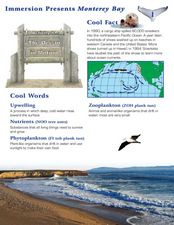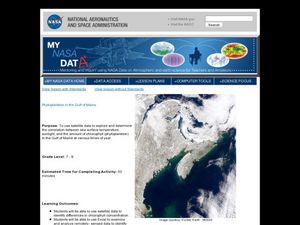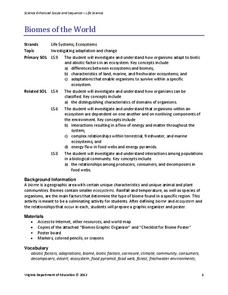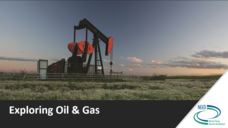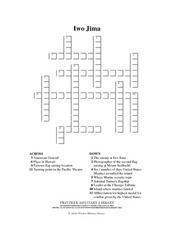ARKive
Adaptation: Design a Species
Adapt is what an animal does to ensure it will survive in a specific environment; maybe it's more complicated than that. Your young animal experts can view this handy presentation to better understand animal adaptations and also complete...
University of Southern California
Human Impact on the Sea
How far does the human hand reach? Five interactive lessons lead classes through a unit exploring the human impact on ocean resources, pollution, and even extinction. Learners discover how their decisions affect the ocean...
Curated OER
Monterey Bay
Students read background information about Monterey Bay, California, and conduct related experiments. In this ocean in motion lesson, students read information about the location, wildlife, and characteristics of Monterey Bay. They...
Education World
Every Day Edit - Sousa Marches
For this everyday editing worksheet, learners correct grammatical mistakes in a short paragraph about John Philip Sousa. The errors range from punctuation, spelling, grammar, and capitalization.
Curated OER
Phytoplankton in the Gulf of Maine
Students use satellite data to see the correlation between sea temperature and sunlight in the Gulf of Maine. In this phytoplankton lesson students use Excel to analyze data.
California Academy of Science
Buoyancy Bulls-Eye
Why does a seastar sink, but a jellyfish float? Through a fun investigation, learners examine the concept of buoyancy using simple household items. The challenge: create neutral buoyancy for an action figure in water. With ample...
California Academy of Science
Fish Forms
I've said it before, and I'll say it again, you can add art to any activity! While little learners are discovering why fish have specific body parts such as, scales, fins, and gills, they start making three-dimensional fish forms....
Florida International University
Designing an Autonomous Underwater Vehicle (AUV): Concepts in Lift, Drag, Thrust, Energy, Power, Mass, and Buoyancy
Engineer an autonomous underwater vehicle (AUV) to study concepts of physics. Using household materials, collaborative groups design and build an AUV and then test Newton's Laws of Motion as they apply them in underwater environments...
University of Southern California
What Lives In The Ocean?
One of the most diverse environments on Earth is the ocean. Young scientists explore the living things found in the ocean during an exciting seven-lesson unit. Their study includes organisms from plankton to invertebrates...
Rivanna Regional Stormwater Education Partnership
Invisible Passengers
How does water pollution affect the organisms living in the water? Use three science experiments to examine how erosion and other pollutants can affect water quality. Each experiment focuses on a different aspect of pollution and...
NOAA
Fishy Deep-sea Designs!
Oceans represent more than 80 percent of all habitats, yet we know less about them than most other habitats on the planet. The instructor introduces the epipelagic, mesopelagic, bathypelagic, twilight, and midnight zones in the ocean....
Virginia Department of Education
Biomes of the World
Incorporate knowledge about biomes and ecosystems in multiple ways while encouraging creativity. Emerging ecologists collaborate and perform research to complete a graphic organizer about various biomes of the world. They conclude the...
National Energy Education Development Project
Exploring Oil and Gas
The United States consumes more oil than any other country, about 1.85 billion barrels (or 77 billion gallons) a day. Viewers learn about the history of fossil fuel exploration and how they are formed in an informative presentation. They...
Curated OER
Iwo Jima
Here is a crossword puzzle on some of the more important aspects of the Iwo Jima conflict during World War II. There are four words to compose going across, and eight words going down. An answer key is on page two of the worksheet. Good...
Curated OER
Energy Resources: Where Are They and How Do We Get Them?
Future energy engineers visit several stations, each one dedicated to a different alternative source of energy. They describe how solar energy is converted into other forms of energy, the patterns of distribution of energy resources in...
Curated OER
Light Stick Chemistry
In groups of three with the lights off and the shades drawn, investigators place inactivated light sticks, in three beakers: one filled with ice water, another with lukewarm water, and the other with room temperature water. They wait...
Other popular searches
- Ocean Ecosystems Animals
- Grassland Animals Ocean
- Animals Ocean
- Animals in the Ocean
- Animals of the Ocean
- Ocean Plants and Animals




